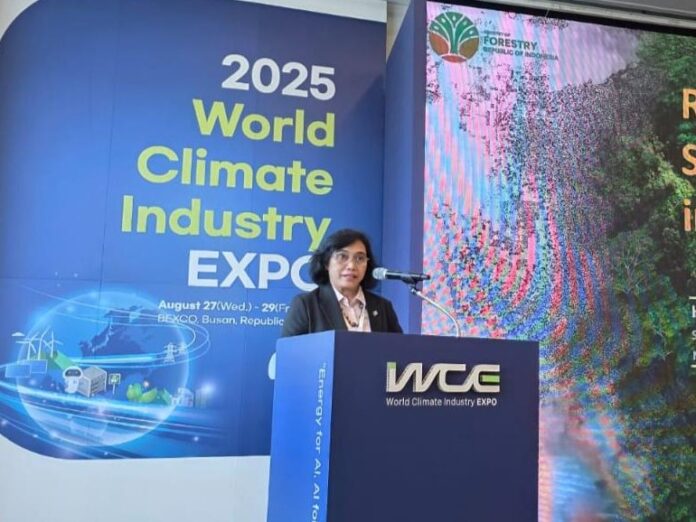Ecobiz.asia – Indonesia’s Forestry Ministry said on Wednesday that preventing forest fires is essential to safeguarding the credibility of global carbon markets, as the country seeks to position itself as a reliable player in climate finance.
Haruni Krisnawati, senior adviser to the minister on climate change, told the World Climate Industry Expo 2025 in Busan, Wednesday (August 27, 2025), that Indonesia’s vast tropical forests — covering 95.5 million hectares, including 13.4 million hectares of peatland and 3.3 million hectares of mangroves — hold some of the world’s largest carbon reserves.
“These ecosystems store up to 40% of global soil carbon. But once disturbed, peatlands and mangroves can quickly turn from carbon sinks into major emitters,” she said. “Forest fire prevention is not just about the environment, it is about carbon credibility.”
Indonesia’s devastating 2015 fires released an estimated 1.75 billion tonnes of CO₂ equivalent and caused $16 billion in economic losses, or 1.9% of GDP, according to World Bank data. The event damaged confidence in forest-based carbon projects, Haruni said.
Jakarta has set a FOLU Net Sink 2030 target, aiming for the forestry sector to become a net carbon sink by the end of the decade. Measures include stopping deforestation, restoring peatlands, rehabilitating mangroves, sustainable forest management and social forestry.
Under Presidential Regulation No. 98/2021 on Carbon Pricing (NEK), Indonesia has also created a legal basis for carbon trading, results-based payments, carbon taxes and other climate finance mechanisms.
“Fire prevention is a prerequisite for every carbon project standard, both in voluntary markets and international compliance schemes,” Haruni said.
Indonesia’s participation in the Busan forum is also part of its push to showcase its carbon pricing framework and attract international collaboration. Haruni said strong fire prevention measures would help Indonesia strengthen trust in carbon markets and open access to more climate finance.
“Carbon prevention is carbon credibility. It is about market trust, economic sustainability, and fairness for communities,” she added. ***





